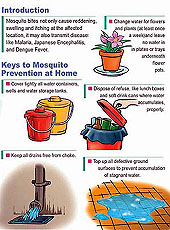 |
Handy tips: Clear stagnant water and drains, properly dispose of refuse, cover water containers and fill up all defective ground surfaces to help deter mosquito breeding. |

|
The public should step up anti-mosquito efforts as ovitrap indices in Fanling, Tai Po North, Sheung Shu, Cheung Sha Wan and Diamond Hill have risen from zero in March to a range from 2.2% to 11.3% in April.
The Food & Environmental Hygiene Department said of the 12 area ovitrap indices available so far for April, five have risen. The areas include Fanling (11.3%), Tai Po North (9.8%), Sheung Shui (5.6%), Cheung Sha Wan (3.8%) and Diamond Hill (2.2%).
The average maximum temperature in April was 24.5 degrees Celsius which is close to the optimal temperature (25 degrees Celsius) for Aedes albopictus, the local vector for Dengue fever.
The department expected ovitrap indices to rise further as the weather gets warmer and damper, providing more favourable conditions for mosquito breeding.
The community should take anti-mosquito measures to contain the index rise so as to lower the risk of local transmission of Dengue fever.
As mosquito eggs can develop into adult mosquitoes in seven days, people should inspect their homes and surroundings weekly to remove potential breeding grounds.
For more details about Aedes albopictus, the ovitrap index and anti-mosquito measures, click here or call 2868 0000. For information on Dengue fever, click here.
Go To Top
|



